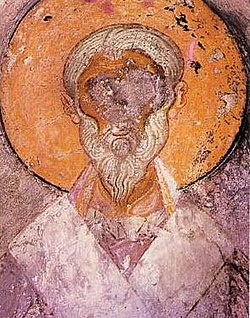Alexander of Alexandria

Alexander of Alexandria († April 17, 328 in Alexandria ) was Bishop of Alexandria from 313 to 328 and at the beginning of the Arian dispute one of the leading representatives of Orthodoxy against Arius .
Life
Alexander was highly respected by the people and the clergy , generous to the poor, eloquent, just and of an ascetic way of life.
Alexander was one of the protagonists at the beginning of the Arian dispute that broke out when Arius accused him of Sabellianism in a disputation . When Arius presented his teachings openly, Alexander initially tried to convert Arius from his teachings and received reproaches from his clergy for being too lenient. As the dispute widened, Alexander called a synod in Alexandria in 320, at which over 100 bishops from Egypt and Libya condemned Arius.
Arius left Egypt and sought the support of Eusebius of Caesarea and Eusebius of Nicomedia , which involved practically the whole of the Christian East in the dispute. Emperor Constantine I sent his advisor Ossius of Córdoba with a letter to Alexander and Arius, urging the two to reconcile and not to quarrel over "such a minor matter".
At the 1st Council of Nicea , Alexander was one of the leading men in the Orthodox Party.
Three letters of his works have survived, which are important testimonies to the initial history of the Arian dispute: a letter to Alexander of Constantinople , another to all Catholic bishops , and the impeachment of Arius. Quotations from letters and sermons can be found in the works of his successor Athanasius of Alexandria .
According to the count of the Coptic Orthodox Church, Alexander is its 19th Pope .
In the Orthodox and Catholic Churches , Alexander of Alexandria is venerated as a saint . His feast day is February 26th and April 22nd in the Coptic Church .
Web links
- The works of Alexander of Alexandria on Wikisource
- Adolf Jülicher : Alexandros 103 . In: Paulys Realencyclopadie der classischen Antiquity Science (RE). Volume I, 2, Stuttgart 1894, Col. 1461 f.
- Alexander von Alexandria's letter to Alexander of Constantinople ( Memento from June 15, 2010 in the Internet Archive ) (English)
- Impeachment of Arius ( memento of March 12, 2007 in the Internet Archive )
literature
- Friedrich Wilhelm Bautz : Alexander of Alexandria. In: Biographisch-Bibliographisches Kirchenlexikon (BBKL). Volume 1, Bautz, Hamm 1975. 2nd, unchanged edition Hamm 1990, ISBN 3-88309-013-1 , Sp. 108-109.
- Thomas Campbell: [URL_in_der_Catholic_Encyclopedia St. Alexander ]. In: Catholic Encyclopedia , Volume 1, Robert Appleton Company, New York 1907.
| predecessor | Office | successor |
|---|---|---|
| Achillas |
Bishop of Alexandria 313–328 |
Athanasius I. |
| personal data | |
|---|---|
| SURNAME | Alexander of Alexandria |
| ALTERNATIVE NAMES | Alexandros; Alexandros of Alexandreia (engraved); Alexander of Alexandria (Germanized) |
| BRIEF DESCRIPTION | Bishop of Alexandria, 19th Pope according to the count of the Coptic Church |
| DATE OF BIRTH | 3rd century |
| DATE OF DEATH | April 17, 328 |
| Place of death | Alexandria |